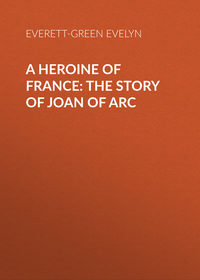 полная версия
полная версияA Clerk of Oxford, and His Adventures in the Barons' War
Leofric was interested in all that concerned his friend, for he had a sincere liking for Hugh, who had been kind to him in a variety of ways. He gladly promised to visit him on the morrow, and take supper with him, being interested in the thought of seeing these Balzanis.
"I suspect there is some love-jealousy at the bottom of this fellow's dislike for Hugh," remarked Jack, when he heard Leofric's account of the matter; "there be some fellows who must always have a sweetheart, and perchance this bully thinks that the fair ladies will think more of Hugh's open face and gentle bearing than of his own. We will go and see for ourselves; for I would be sorry that any hurt should come to good Hugh. He is a very proper fellow; but in such a city as this any evil-disposed person might seek a quarrel with his rival, and do him a deadly mischief without fear of anything worse than the Chancellor's prison. Benefit of clergy may be source of safety to some, but it can be a source of peril too, when the vilest of the land claim it as a cloak for their worst sins."
The new clerks were beginning to learn many lessons as to the working of the prevailing system, and they heard many things from Brother Angelus, whose lecture-room they sought whenever they could, and who seemed to take a special interest in these two lads. Once they had accompanied him in a round of visits amongst the poor in the parish of St. Ebbs, and had longed to emulate his skill and tenderness with the sick. It seemed strange to them to see one who was so learned in saintly lore, and who was so revered in his own school by the pupils of St. Francis, humbling himself here to perform the most menial office for the poorest person, without a thought for his own dignity or position. But it was alike the theory and the practice of the friars to humble themselves to tend their brethren; nor did they think it shame to ask alms at the doors of the rich, for they might possess nothing of their own, and must needs beg sustenance for themselves and for those whom they desired to help.
Leofric and Jack had by this time settled what lectures to attend and what masters to follow. They had been perplexed for a while at the choice before them, and by the solicitations of their superiors for a hearing in their particular schools. They had visited a considerable number before finally deciding, and were now deeply interested in the daily lectures they heard upon a variety of subjects. Jack declared he had never had such a hard time in his life, and he wanted a good deal of help from Leofric in taking in what he heard. But both lads had sharp wits and a great thirst for information, and they soon attracted the notice of their instructors by their regular attendance, and by the attention they bestowed upon the lecture.
So far they had not made a great many acquaintances amongst their fellow-clerks, the number of whom was quite confusing at the outset. Some amongst them were too rough and uncouth to attract them, whilst others, more gently born, were superior to them in station, and they feared a rebuff should they attempt to make advances. Life was simpler in its conditions in those days, and friendships easily grow up when the young are thrown together; but pride of race is nowhere absent, and both Leofric and Jack had a great dislike to putting themselves forward in any way.
There was a great deal of talk in the city at that time, and indeed all over the country, as to the condition of affairs betwixt the King and the Barons. Leofric and Jack were only gradually beginning to take any interest in political matters, being sufficiently engrossed just now in their own affairs; but Hugh talked often to Leofric about the great Earl of Leicester, who had married the King's sister, and who was now the head and champion of the Barons' party. He spoke of him with the ardent enthusiasm of youth, called him the greatest and noblest man of the day, would tell long stories of his prowess in Gascony and other places, and of the ill-treatment he had ofttimes received at the hands of the capricious and unstable monarch.
"The King never knows his own mind two days together!" the young man had scornfully declared, "and he makes promises only to break them. He is the tool and dupe of the Pope, and is bleeding his country to death, sending all its wealth across the seas for objects with which we have no concern. And then he breaks every promise whereby he has attained these moneys, and our charters and liberties are trampled underfoot, even when he has most solemnly promised to observe and respect them."
Hugh was an ardent supporter of that party in the kingdom which began to be called the Barons' party, and Leofric and Jack drank in his spirit eagerly. It was, in fact, the prevailing one amongst the members of the University of all grades. The friars, too, were far more in sympathy with the champions of the liberties and rights of the people and the constitution, than with the aggressions and tyrannies of a Pope-ridden monarch. So that Oxford, although divided in some measure upon the burning questions of the day, inclined on the whole very much in favour of that party of which Simon de Montfort, Earl of Leicester, was now the acknowledged head.
When Hugh escorted his two friends through the streets to Dagville's Inn, where they were to sup with him as arranged, he was considerably excited by a rumour which had just reached the city, and which was causing no small stir there.
It was said that Oxford had been chosen as the place where in a short time, perhaps two months hence, a Parliament was to be assembled in which the burning questions of the day were to be discussed, and some settlement of a definite nature arrived at between the King and his nobles. The very idea of this great assembly sent a thrill of excitement through the place. The streets were crowded with knots of clerks and citizens, for once all gathered amicably together, discussing the news which had been brought from London, and wondering whether it were true.
Dagville's Inn presented a lively appearance. Its porch and bar were crowded with guests, and a dark-faced man, who spoke with the accent of a foreigner, was busy serving the guests, as was also a youth with a tousle of frizzy hair and a pair of shifty black eyes, who bore a strong resemblance to mine host, but looked a great deal more crafty and cruel.
Leofric observed his face as he passed in, and noted that he gave an ugly scowl at sight of them. It seemed plain that he had no liking for Hugh, although what was the cause of the grudge he bore him it was less easy to decide.
Hugh pushed his way through the lower room, his guests following; and after mounting to the upper floor, they found themselves in a pleasant room, not unlike that in which they had seen the Seaton family assembled on their first arrival at the city. Its window, which was large and latticed, though the lattice stood wide open to the mild evening air, looked upon the High Street; and upon the window seat lay a lute, and a piece of fine embroidery work such as was seldom seen save in the nunneries or in the houses of fine ladies.
A table in the centre of the room was set for supper, but the apartment itself was empty, and Leofric took up the lute gently, and fingered it with loving touches. But the next moment he put it hastily down, for the door opened, and a pleasant-looking motherly woman came in bearing a smoking dish, and she was followed by two maidens, each with a dish in her hands.
Hugh stepped forward to relieve one daughter of her load, and Jack did the same by the second. Leofric, who was more shy by nature, stood where he was in the window, looking in a sort of amaze from one girl to the other. Both were dressed exactly alike, in a semi-Italian fashion which he thought most bewitching; but it was the beauty of the two faces, and their extraordinary similarity, which confused and bewildered him. No wonder Hugh had said it was hard to tell one sister from the other; he marvelled that any should learn to know them apart. To his eyes the faces seemed identical, the same rich colouring, the same dark velvet-soft eyes, the same flashing smile and finely-pencilled brows.
Hugh made him known to the sisters, who were girls of about his own age, albeit their southern blood made them appear older than their age. He called one Lotta and one Linda, and asked Leofric if he thought they would do as models for him.
The young artist blushed to the roots of his hair, and knew not what to say; but one of the maidens laughed merrily, and looked archly into his face.
"Methinks if he wants an angel-model, he had best take his own portrait," she said, in clear musical tones; whilst the other sister added in a voice of precisely the same character, —
"Or seek to get a glimpse of lovely Mistress Alys at the Castle. Methinks she has the fairest face of any maid in the city."
Whilst the young people were talking together in the window, and drawing out Leofric to tell them of his art, and even to show them what he could do by means of a bit of charcoal upon a piece of wood, a tall, burly, dark-browed young fellow lounged into the room, and looked across at the group round Leofric with a scowl in his deep-set eyes.
Jack was the only one who noticed his entrance, and he knew the intruder to be Roger de Horn, who had a certain notoriety in the place as being one of its most turbulent spirits.
"Supper, supper, good folks," called the mistress from the head of the table, where she had seated herself before another smoking dish which she had been to fetch. "If the father and Tito are busy for the moment, we must not let the supper spoil. Doubtless they will join us when they smell the viands. – Come, young sir, and let us see if thou canst wield a knife as well as a pen, for I believe not in your starveling clerks. Good victuals make good scholars, as I always say."
The hostess was a cheerful soul, and her calling in life had given her easy, pleasant manners that won her good-will from all. She looked little enough like the mother of the crafty Tito, or even of these beautiful girls. Tito, in truth, was not her son; for Balzani had been married twice, and his first wife had been of his own nationality. Tito was several years older than the twin sisters, and no very great likeness existed between them. Yet the daughters looked far more Italian than English, although they spoke their mother's tongue with perfect fluency, and without any sort of accent. They were both very charming girls. Leofric could not on that occasion decide in the least which was the more charming, for he could not tell them apart. Sometimes he thought he was beginning to know them, but again found himself completely at fault. But he was delighted with the permission accorded to him of drawing their portraits, and the girls' eagerness over this matter amused and gratified him not a little.
Roger seemed in a very ill temper all the while, as Jack was not slow to notice. He sat silent and sullen at the board, nor did it soothe him to observe that nobody seemed to miss him or take note of his ill-humour. All were occupied with Hugh and his guests, chattering and laughing gaily. Nobody appeared to have a word or a look for him, unless it were the hostess, who pressed him sometimes to partake of one or another of the dishes on the table, but always returned to join the chatter of the young folks, which plainly interested her much more than the morose responses of Roger.
When Balzani and his son appeared, they were full of the news which was exciting the place. The innkeeper was pleased with the thought of all the fine company that this meeting would bring to the town. He did not profess to know or to care very much about the rights of the case; he was still too much the foreigner to enter keenly into English politics. But the local excitement he thoroughly appreciated, and when he got a chance he questioned Hugh closely about the great Earl of Leicester and his household and retinue, wondering whether so great a man would condescend to lodge in his house, and if so, what gain such a thing would bring to him.
When Jack and Leofric took their leave, promising another visit soon, Hugh walked with them part of the way, asking their opinion of his quarters and his friends.
"I'd have a care if I were thee," said Jack, with one of his shrewd glances; "for that braggart Roger de Horn is no friend of thine, and methinks Tito and he are fast friends. In this city it behoves men to walk warily if they have foes abroad. I would have a care if I were thee."
CHAPTER VI
A "MAD" PARLIAMENT
"'Twill be a mad Parliament, gentlemen, a mad Parliament," said one reverend doctor, as the news was definitely made known in Oxford that that place had been selected by King and Barons as a neutral spot where the adjourned Parliament should meet.
Great excitement reigned throughout the city and University. Nothing was talked of but the political situation, the weakness of the King, the resolution of the Barons to enforce the terms of the Great Charter upon the tyrannical monarch, and the possibility (only too well grounded) that the Sovereign, advised by his foreign favourites, would seek to call in aid from abroad, and overrun the fair realm of England with foreign mercenaries.
"But hireling foreigners must be paid," remarked one citizen grimly, as this danger was mooted, "and until the nation gets its rights and liberties, no more money will his Majesty wring from it. The sinews of war are in our pockets, and there they shall stay unless the King chooses to hear reason."
"Ay, and more than that," cried Gilbert, hurrying up to join the eager crowd; "I have had good news from my father in the south. He tells me that the Barons have garrisoned the Cinque Ports, so that no foreigners may land on our coasts. As the truce with France has just expired, they have good reason for this step, without doing any disloyalty to his Majesty; but all the world knows with what special object it has been done at this moment. Methinks we shall be free from fear of foreign invasion, and that we shall obtain our liberties without bloodshed."
"Heaven grant we may!" cried the older and graver amongst the townsfolks, some of whom remembered, and others had heard from their fathers, the tales of the terrible struggle in John's time, which had led to the granting of the Great Charter. They wanted no repetition of such scenes as those; albeit some of the younger and more ardent spirits, and the lawless and violent ones, would not have been displeased had some open collision occurred which should cause the whole country to fly to arms.
Even as it was, great impetus had been given to the joustings and practices of wars in the meadows around the city. Both clerks and citizens went out afoot or on horseback during the long evenings of summer, and often such a tumult arose, and such a din of arms, that one might well suppose some real battle was going on rather than an imitation of it.
June had come, and all the world was clothed in verdure. Oxford was looking her best and brightest at this season. As the day for the assembling of this Parliament drew near, the excitement became intense. Lectures in some cases were suspended, and discipline of any kind became enforced only with difficulty.
As usual, there were two parties in the city. The very fact that the scholars sided almost to a man with the Barons' party disposed some of the citizens to throw in their sympathies with the King. Henry was no special favourite, but he was personally beloved by those who had at any time had access to his presence. He was not vicious, and he was devout; his defenders could always say many things in his favour. He was not a monarch to inspire respect or personal enthusiasm; but then neither was he one who roused against himself any great outbreak of popular rage. Had he lived in less critical days, or been better advised, he might have passed through life comfortably and easily, and have been regarded as a good and well-meaning monarch.
"We must needs see some of these great sights!" cried Jack excitedly to Leofric, after coming back from a prowl round the city one evening. "They say that to-morrow the Barons will march into the city; and upon the day following the King will arrive at Beaumont Palace. We must go forth to see these brave sights. Marry, what a time it will be for Oxford! Right glad am I to be here at such a season! Think of it – I might have been following the plough behind my father's horses, knowing naught of the great things that be doing in the world!"
A few minutes later and Hugh burst in, quivering with excitement.
"The great Earl of Leicester with his train comes to-morrow," he cried, "and many others of the Barons as well. Some will lodge here, and some there; but the great De Montfort and his sons will come to Dagville's Inn, and for the nonce all who are there must make way. So I come to beg a lodging with you, my friends; and if fortune favours us, I will seek to get speech with my old playmates, Guy and Amalric, and will present ye both to them."
"Are they the sons of the great Earl?" asked Leofric eagerly.
"Ay; and time was once when I went as a page with my father to Kenilworth, and we played together, we boys. Guy and Amalric are the two youngest sons. The elder pair have won knighthood for themselves beyond the seas. But these be yet lads still, albeit, if report says true, very proper and noble lads. Right well do I hope that they will accompany their father on the morrow. Methinks they will not have forgotten me. Amalric was very friendly in those past days, and we vowed to love each other always."
There was little sleep for the trio in the turret that night. Jack and Leofric made Hugh tell them everything he could remember of the De Montfort family at Kenilworth, when he had been there as page.
They wanted to know, too, the names of the other Barons who would support the Earl of Leicester; and although parties changed with somewhat confusing rapidity, as private jealousies or conflicting interests made the friend of to-day the enemy of to-morrow, yet Hugh knew pretty well who were likely to range themselves upon the side of the liberties of the nation, and could give bits of information to his companions about the great nobles of the day.
The Earls of Gloucester, Hereford, and Norfolk were, he thought, certain to support the Earl of Leicester, and also Hugh le Bigod and Hugh le Despenser, whose names were pretty well known at that time. The King was more likely to be backed by Bishops and Archbishops, especially such as still held themselves subservient to the Pope. Then he was almost certain to be attended by some of the De Lusignans, his half-brothers, and by numbers of other foreign favourites, whose constant presence at Court was such an offence to the nation.
"They eat up everything before them, like so many locusts!" cried Hugh hotly. "So soon as any place becomes vacant, the King, instead of promoting some honest English gentleman to it, who may have served him faithfully for years, throws it to one of his foreign favourites, who may have a dozen such offices already. They drain the life-blood from the country, and we, its sons, are left to take what pickings we can get!"
It was easy to understand how bitterly the English nobles and gentlemen were beginning to resent this kind of thing; and when it was combined with a constant infringement of their liberties, and an equally constant imposition of new and illegal exactions, anger became exasperation, and the sense of a coming crisis was in the very air.
The short night was soon over, and with the first of the sunlight the three lads awoke from their light slumbers.
There was no lingering abed for any that day. Hardly had they returned from their plunge in the pool, and arrayed themselves in their best habits, before sounds in the streets warned them that all the city was up and doing.
Hurrying forth, they saw that the citizens had begun to deck their houses as if for a festival: flags were flying from windows, and bands of clerks paraded up and down the streets, singing songs, cracking jokes, and sometimes striving to make speeches in imitation of those which would be made when the conference should have assembled.
Mummers were pouring into the town, as they always did on any holiday, and at the street corners they were to be seen going through their rough representations or practising some rude sort of jugglery. It was plain that there would be no lectures that day. The clerks were far too excited to attend, and the masters little less so.
But many hours must of necessity pass before the Barons would be likely to arrive at the city gates. These hours had to be got rid of somehow, and Leofric suggested that they should go and see if Brother Angelus were lecturing in the school of the Friars, since perhaps the excitement had not spread so much into the religious establishments as into the Halls and lodging-houses.
Friar Angelus truly was there, and so were the pupils of his own school, but very few outsiders came in that day; and the lecturer did not keep his hearers very long, dismissing them with a smile, and cautioning them not to get into any mischief or trouble in their excitement.
He looked pleased to see Leofric and Jack, and spoke to them as he passed out. They asked him rather eagerly which side he took – that of the King or that of the Barons. He answered, with one of his thoughtful smiles, that these matters were not given to him to judge of – that he meddled but little in the strife of nations; but if he had to judge of any question, he sought always to discover the teachings of Holy Scripture, and to judge according to the mind of Christ.
By this time messengers had come to report that the Earl of Leicester, together with the Earl of Gloucester, had reached Abingdon, where they had halted to dine, and that they might be expected to arrive at the Grandpont by three o'clock in the afternoon.
All the city seemed in motion towards the South Gate, which led towards the Grandpont (as Folly Bridge was then called), and Gilbert rushing up joined himself to the other three, and urged them to come and see all that was to be seen.
The narrow street was quite blocked with foot passengers – clerks, citizens, masters and doctors all mingling together in one moving mass. It was a good-natured crowd, and there was much laughing and jesting as they had to squeeze through the gateway, and again across the bridge, until in the meadow beyond they had breathing room, and could spread themselves out more at ease. Here, dotted about in picturesque groups, were knots of persons who had come from the surrounding districts – farmers on their stout nags, with wife or daughter perched on a pillion behind; and there, too, were groups of squires and gentlemen from the neighbouring houses or castles, many of these having brought their women folk to watch the procession pass.
One group attracted attention from the fine trappings of the horses, and from the general air of importance it wore. There were two ladies, several horsemen in fine garments, and one tall, commanding personage, who was evidently an official of some sort. He was surrounded by several soldiers, who observed an attitude of watchful attention; and Gilbert said to his comrades in a quick whisper, —
"Yon is the Constable of the Castle. They say he is very favourable to the cause of the Barons, though he calls himself the servant of the King. He is a good man, and well beliked in Oxford, albeit he and the Chancellor sometimes come to loggerheads anent the limits of their jurisdiction; yet they be good friends for all that. There goes the Chancellor to speak with him and join his party."
Leofric looked rather eagerly towards the little group around the Constable, and truly enough there sat Mistress Alys upon her palfrey, her golden hair hanging like a cloud about her face, her eyes gazing round her full of curiosity. Suddenly she met the gaze bent upon her, and started a little. Then a look of recognition flashed into her face. She glanced at her father, but he was engrossed in conversation, and did not see. Failing in getting his attention, she just raised her hand, and waved it for a moment towards Leofric and his companion; then blushing a little as if at her boldness, she drew back behind one of the horsemen in the group.
Leofric bared his head and bowed low at the little lady's salute; but he made no further attempt to attract attention, and the friends passed quickly through the crowd lingering at the head of the bridge, and made their way along the road towards Abingdon, where numbers of the citizens were already straying, in hopes of catching sight of the foremost of the Barons' followers.









